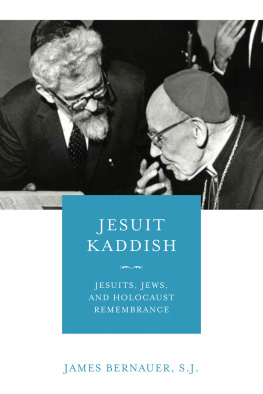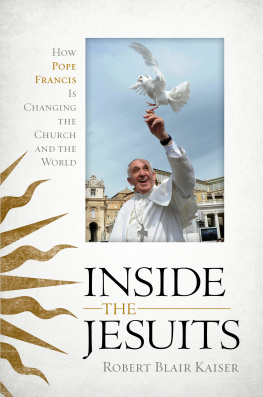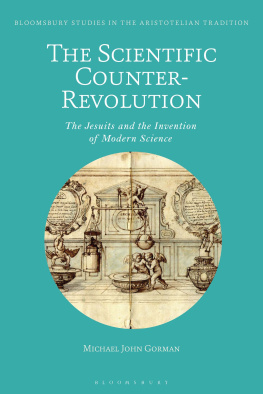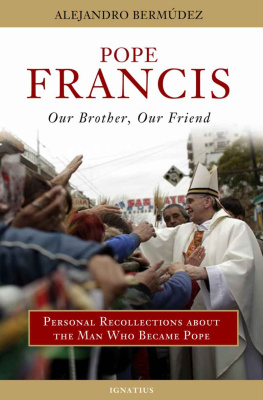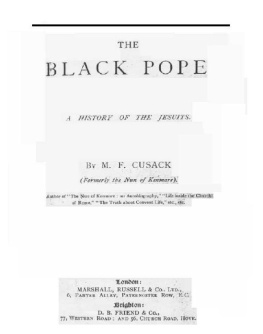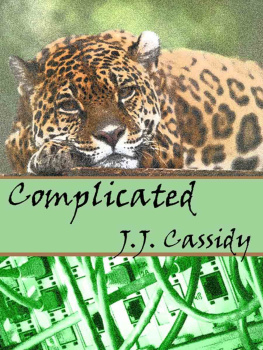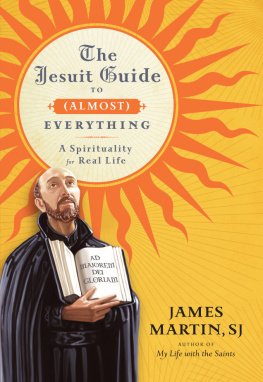Copyright 2020 by the University of Notre Dame
Notre Dame, Indiana 46556
All Rights Reserved
Published in the United States of America
Library of Congress Cataloging-in-Publication Data
Names: Bernauer, James William, author.
Title: Jesuit Kaddish : Jesuits, Jews, and Holocaust remembrance /
James Bernauer, SJ.
Description: Notre Dame, Indiana : University of Notre Dame Press,
[2019] |
Includes index.
Identifiers: LCCN 2019054898 (print) | LCCN 2019054899 (ebook) |
ISBN 9780268107017 (hardback) | ISBN 9780268107048 (adobe pdf) |
ISBN 9780268107031 (epub)
Subjects: LCSH: JesuitsHistory20th century. | JesuitsHistory
21st century. | Holocaust (Christian theology) | Holocaust, Jewish
(19391945) | Catholic ChurchRelationsJudaism. | Judaism
RelationsCatholic Church. | Vatican Council (2nd : 19621965 :
Basilica di San Pietro in Vaticano). Declaratio de ecclesiae
habitudine ad religiones non-Christianas. |
Righteous Gentiles in the Holocaust.
Classification: LCC BX3706.3 .B47 2019 (print) |
LCC BX3706.3 (ebook) |
DDC 261.2/608827153dc23
LC record available at https://lccn.loc.gov/2019054898
LC ebook record available at https://lccn.loc.gov/2019054899
This e-Book was converted from the original source file by a third-party vendor. Readers who notice any formatting, textual, or readability issues are encouraged to contact the publisher at
ACKNOWLEDGMENTS
My debts to the many people and institutions that have assisted me in my work on this long journey of research and writing are profound and extensive, and it is a pleasure to acknowledge some of them here. The Jesuits who had been recognized by Israels Holocaust Center, Yad Vashem, and with whom I lived in Paris were an initial inspiration. During my many years at Boston College I have received the support of a vibrant Jesuit Community, an excellent academic institution, outstanding colleagues in many departments, and many talented students who have encouraged my questions. Boston College and its president, Father William Leahy, honored me with the Kraft Family Professorship, and that made it possible for me to attend the conferences and visit the institutions where I could do my work.
I have been blessed over those years by an extraordinary group of interdisciplinary research assistants: Peter Glazar, Dalia Nasser, Rufus Caine, David Giles, Jason Barrett, Jessica Wuebeker, Tracey Stark, Peter Li, Joseph Haggerty, Grant Edwards, Strand Sheldahl-Thomason, Martin Bernales, Derek Brown, and especially Felix Jimenez, who has worked with me for five years as the Kraft Family chairs assistant both in Boston and in Munich.
I have profited from many libraries and archives, especially those at Boston College, where the staff could not have been more helpful. I thank the researchers at Yad Vashem in Jerusalem and the Reverend Robert Bonfils, the retired archivist at the Jesuit archives in Vanves, France.
I have had the opportunity to develop my ideas in lectures at many institutions from whose scholars and students I have learned, and I am very appreciative of their invitations: Le Moyne College in Syracuse; the University of Santa Clara, where I was a Bannan Foundation Fellow; De Paul University in Chicago; Romes Gregorian University; Loyola University of Chicago, where I occupied the Jesuit University Professorship; the Ateneo University of Manila; the cole des Hautes tudes en Sciences Culturelles in Tokyo; Nazareth College in Rochester; John Carroll University in Cleveland; the College of the Holy Cross and Assumption College in Worcester; the University of Massachusetts in Boston; the Jagiellonian University in Krakow; the Pontifical Biblical Institute in Jerusalem; and the Vanderbilt University Divinity School in Nashville.
I thank the editors of two journals and one collection in which I published earlier fragments of chapters 1 and 4: Studies in the Spirituality of Jesuits (Summer 2004), the Journal of Jesuit Studies (Spring 2018), and The Tragic Couple: Encounters between Jews and Jesuits (the Netherlands: Brill, 2014). I am very grateful to Dr. Robert Maryks, who is the founding editor of the Journal of Jesuit Studies and who has become a personal friend.
Among the scholars and friends I wish to thank are Walter Modrys, Edward McGushin, Serena Parekh, Kyle Logan, Vanessa Rumble, Douglas Kull, Michael Mahon, Paula Perry, Peggy Bakalo, Arthur Madigan, Susannah Heschel, Frank Herrmann, Chi and Zheng Zeng, David Rasmussen, Pamela Berger, Jeffrey Johnson, David Neuhaus, Alec Walker, Camille Markey, Richard Lynch, Ruth Langer, Frank Clooney, Martin Bernales Odino, Agustin Colombo, Bernardo Sada Monroy, Vincent Lapomarda, Martin Stuflesser, and my brothers Jack and Kenneth. Of course they are not responsible for any errors or shortcomings in my study.
My dealings with the University of Notre Dame Press have been professionally satisfying and personally enjoyable. I appreciate the original interest in my project by its director, Stephen Wrinn, the ongoing care of its acquisitions editor, Stephen Little, and the professional assistance of its copyeditor, Marilyn Martin. I hope that I will learn someday the identities of the two scholars who anonymously reviewed my manuscript for Notre Dame. To them I would express my appreciation for the remarkable learning and generous diligence they exhibited in suggesting improvements for my text. They strengthened this volume immeasurably and set a new standard for me as to how reviews should be done.
PERSONAL PRELUDE
The two words of this books title may startle. Why join together one of Judaisms most recognizable prayers with the name of the Roman Catholic order of the Jesuits, which is officially known as the Society of Jesus? This volume will present a response to that question as we meditate on the drama of the Holocaust and the Jesuits. Here, however, in a personal prelude, some guiding emotions might be expressed, feelings for the welcoming of life and for the acceptance of death. Life, first of all, because the Kaddish is a prayer of praise of God and of the holy gift of life. Magnified and sanctified may his great name be in the world that he created, as he wills, and may his kingdom come in your lives and in your days, and in the lives of all the house of Israel, swiftly and soon, and say all Amen! Those are the first two stanzas of the six-stanza prayer. As descendants of the Jewish elders in faith, there is not a single word of the prayer that Christians cannot proclaim faithfully, not a single word that Christians would not embrace. Should not all who have read the Torah, even if under a different name, be able to join the chorus in petitioning, May a great peace from heaven and life!be upon us and all Israel, and say all Amen? (That was the fifth stanza.) Still the Kaddish is a prayer of mourning, a litany that challenges death. For the Jews, the prayer first emerged in the wake of the Crusades, for Christians and Jesuits in the aftermath of the Shoah. We who are Catholics are not strangers to Jewish cemeteries. Isnt the most extensive of them, Auschwitz, located on the soil of one of Europes most Catholic countries and now a site of international visitation?
A French priest, Father Patrick Desbois, has devoted years to a sacred mission: to locate every mass grave or site at which Jews were killed during the Holocaust. His motivation was a Jewish invisibility: While the mass graves of the thousands of Jews who were shot are untraceable, every German killed during the war has been reburied and identified by name. The cemeteries are on the scale of the Reich. Magnificent cemeteries for the Germans, including the SS, little graves for the French, white stones covered in brambles for the tens of thousands of anonymous Soviet soldiers, and absolutely nothing for the Jews. Of course, there are other reasons for a Catholic presence at Jewish graveyardsout of respect for the dead, to mourn, certainly; but perhaps out of moral necessity as well, to wonder: How responsible are we Christians for such mass deaths? Were some of our words and beliefs murderous? Did we respect them in life, these people who are now buried?



